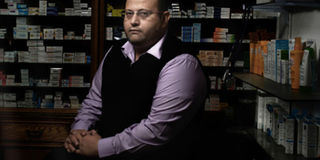A prescription for access to medicine

When Waleed Shawky came across a large cache of donated medicine in a Cairo mosque in 2010, he was awestruck. The pharmacist had long wondered where the E£1 billion (US$112 million) of medicine that is wasted every year in Egypt goes.
Medication is out of reach for a significant number of the country’s people. With 17 percent of Egyptians having trouble purchasing food, even inexpensive medication can be a devastating expenditure.
Shawky launched Medicine For All, an NGO that collects surplus medicine—unused or partially used—and matches it with needy patients. The majority of donations come from pharmacies and pharmaceutical companies, since they are not allowed to sell medicine three to six months before expiration.
Donations also come in from private individuals who, by law, must buy full packages of medicine, whether or not smaller quantities suffice. Last year the organization helped 60,000 patients.
In Medicine For All’s headquarters, in the Cairo neighborhood of Nasr City, a large donation from a pharmaceutical company is spread across a dozen plastic weave bags, waiting to be sorted. Shawky trains volunteer pharmacy students to screen the donated medicine.
They discard expired or compromised medicine, cataloguing the rest into a database. Then the medicine is either distributed via partner NGOs or in medical caravans organized with local doctors.
“I can’t even buy half a pill,” said Saber Mostafa Mohamed, a 64-year-old former plumber with a heart condition. Mohamed receives E£360 a month in social insurance, but his medicine would cost him at least E£600 a month, meaning the medicine was a literal life-saver. “I would’ve had to put my fate in the hands of God.”




